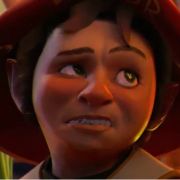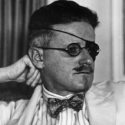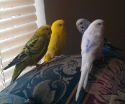|
DivisionPost posted:Okay, then here's one schmuck's opinion. The other guard was smart enough to stand back, but not smart enough to tell his colleague (Tell him what?). Tell him not to get that close to an unknown adversary. I thought the context of "the other guard was smart enough to stand back" made that clear, but I guess not. “We won’t warn you again. Come out in five seconds or we’ll shoot!” (Who's saying this?) One of the guards, obviously. They're going to lose this fight and never be seen again, so does it matter which one said it? “Wait. Please don’t hurt me!” Leara said, filling her voice with fear. (I'd find an attributor here that shows that she's filling her voice with fear. Good idea, I can re-write that to be more descriptive. (Internal dialogue should usually be saved for when you need to express something that can't be shown. I guess I'll need to work on that. I'm using a lot of it. Leara hurled the rock (Be sure you've already established the presence of a rock before you refer to it as "the" rock.) Yes, I did that in a sentence before the excerpt started. (How did she get from presumably hiding in the bushes to getting close enough to go for the rifle?) Good point. She grabbed the gun from the guard who was poking the bushes with the gun, but I can add something like "Too late, he snapped his head back when he heard the bush rustling." to indicate movement. She reversed the motion (What motion?) It was just in the previous sentence. Am I really that terrible at painting a picture? She wrenched the gun away from the guard, it was in motion away from the guard, then she thrust it forward. I'll re-write it in more direct and clear terms. (Try personalizing this beat; let's see it from her perspective. That comes right after, but I left it out because the action sequence was over. EDIT: I've re-written the fight scene, but I'd rather not clutter the thread up too much. Stabbey_the_Clown fucked around with this message at 22:24 on Jan 23, 2013 |
|
|
|

|
| # ? Apr 29, 2024 18:15 |
|
FauxCyclops posted:Some posts earlier in the thread led me to finally watch the movie Adaptation and then I was pointed towards the Robert McKee story seminars. Weighing the possibility of attending it myself sometime aside, I'm looking at getting his book because it seems to be pretty universal stuff that can be applied to fiction as well, and I can 'eat around' the stuff specifically pertaining to the visual aspect. Anyone else read it? Generally I agree with HiddenGecko on this kind of thing, but I liked the first half of this (I didn't finish it.) It's basic, sometimes to a slightly philistine degree, but it's a good look inside traditional narrative structure and how it works. The bit on how characters grow by learning from their mistakes is a good example - it's obvious, but McKee draws out the implications really well. And there are lots of examples, too.
|
|
|
|
HiddenGecko posted:If you watched Adaptation and you got the urge to adopt McKee's lessons on writing then we were watching two very very different movies. Considering that the movie in of itself is a commentary on the kind of movies produced through McKee's methods and it was definitely not a flattering depiction. (By god, McKee even becomes a Deus Ex Machina old man halfway through the movie as he's berating the main character not to include one in the script of the movie you're watching!) That certainly is a different way to look at it. I felt like McKee's lambasting of Nic Cage's character was pretty on the money, even if the last half hour of the film takes his advice to an absurd degree. I feel like if McKee is as big of a name in the screenwriting world as it seems, it'd probably be prudent to at least read his book-- even if I eventually decide it's all crap and do the exact opposite out of spite, you gotta know the rules to break them. Thanks for reminding me I need to pick up On Writing, though, my roommate swears by it.
|
|
|
|
Someone posted a link in this thread ages back - I can't find it anymore, here or on Google - to an article about how Cormac McCarthy's habit of dropping quotation marks for dialogue was dumb. It was in a fairly major publication, the NYRB or New Republic or something. Can anyone point me to it?
|
|
|
|
freebooter posted:Someone posted a link in this thread ages back - I can't find it anymore, here or on Google - to an article about how Cormac McCarthy's habit of dropping quotation marks for dialogue was dumb. It was in a fairly major publication, the NYRB or New Republic or something. Can anyone point me to it? This one? Wall Street Journal.
|
|
|
|
Yeah, that's it. Cheers.
|
|
|
|
Adaptation's portrayal of McKee is conflicted. On the one hand we see the extreme of following the model as ending in formulaic nonsense, on the other we see that without any structure whatsoever Charlie just flounders around, and is stumped when asked to explain to McKee why he, as an audience member, should give a poo poo about the story he has to tell. Charlie-as-actual-screenwriter doesn't quite agree with McKee but sees a discipline to him.
|
|
|
|
Echo Cian posted:This one? Wall Street Journal. quote:Literature is not very popular these days, to put it mildly. According to the National Endowment for the Arts, nearly half of Americans do not read books at all, and those who do average a mere six a year. You'd think literary writers would be bending over backwards to ingratiate themselves to readers -- to make their work maximally accessible, straightforward and inviting. But no. Seriously though, I read the whole article and I get what he's saying (and admittedly his points later on in the article are superior to his opening paragraph), but he's simply not very convincing. There is a definite visual aesthetic when it comes to keeping/scrapping quotation marks on the page, and that visual aesthetic does play a role in the reader's ingestion and internal compartmentalization of the information, in my opinion. Same as juggling sentence structures, paragraph sizes, dialogue/exposition balance, etc. 3 of the last 4 short stories that I've written are barren of quotation marks, and I think it's the right call for all of them. I kept the marks for one of them because, I felt, the content of the story and the tone and circumstance of the narrator merited their inclusion. I want people to read my stories - I want lots and lots of people to read and enjoy them, but I'm not going to sacrifice their content in any way (beyond editing for stuff like word count and other journal-related issues) because Gus from New Hampshire couldn't get into Cormac. I wrote my most recent story in second person, and one piece of feedback I received was, "It would be easier to read if it was in third or first person," which was a stupid piece of feedback, and I took it to heart solely so I could lay it out in a post like this one and spit on it for being pointless. If the story would have worked better in first or third, then we're talking. I like it in second. But that's another topic.
|
|
|
|
It's an interesting article but it completely shoots itself in the foot with the example it gives. I'm a little worried that sometimes lit fiction is different in form simply for the sake of being different: "look at me, I'm so weird because you won't understand it you pleb." Then this happens: quote:Since Cormac McCarthy may be most responsible for popularizing the custom, let's examine a passage from his 2005 novel "No Country for Old Men":
|
|
|
|
It's a favorite argument of a lot of literary critics that McCarthy's punctuation games are a gratuitous affectation basically meant to shout LOOK I AM A WRITER at his audience. I just sit down and watch literary criticism thrash about in the quicksand of its own irrelevance and wave The Border Trilogy in front of its face.
|
|
|
|
I find that the lack of quotation marks just applies a numbing effect on the entire piece. It makes the dialogue, stage direction and description all blend together, and not in a good way. That effect is amplified if you also strip away dialogue tags so you don't know who is talking. For me it does not convey a vast sense of openness just because it is outside. (Would a lack of quotation marks still convey a sense of openness if used between two people in a closet?) EDIT: Unrelated, is a 12,000 word piece too long to be posted in the forum for critique (even offsite on google docs or something)? It was a murder mystery, my entry into the Steam Christmas contest. I could clean it up, but I suspect that just the length alone would discourage anyone from bothering. Stabbey_the_Clown fucked around with this message at 15:28 on Jan 24, 2013 |
|
|
|
I've always found dropping quotation marks to lend a sort of dreamlike, less real, less concrete atmosphere to stories. Obviously that works for some but it absolutely doesn't for others. The pet peeve I have is that a lot of young authors mimic it (along with writing in present tense) because they think it makes their work seem more "literary."
|
|
|
|
If any of you have Kindles or don't mind reading on the computer, the Best American collections from last year are 2 bucks each on Amazon today. They're always good for a look through and, at that price, won't feel bad if you skip stuff that doesn't interest you. http://www.amazon.com/gp/feature.ht...rd_i=1000677541 house of the dad fucked around with this message at 19:46 on Jan 24, 2013 |
|
|
|
gigawhite posted:If any of you have Kindles or don't mind reading on the computer, the Best Of collections from last year are 2 bucks each on Amazon today. They're always good for a look through and, at that price, won't feel bad if you skip stuff that doesn't interest you. I've always loved these series, especially the travel writing collection. Well worth the $2.
|
|
|
|
I Am Hydrogen posted:I've always loved these series, especially the travel writing collection. Well worth the $2. Yeah, it's a great series for seeing what's coming into vogue in the community in terms of style and the like. I do wish they'd get Gaiman to put together a more genre-minded collection, but I'm a literary fiction snob so it works out for me.
|
|
|
|
gigawhite posted:If any of you have Kindles or don't mind reading on the computer, the Best American collections from last year are 2 bucks each on Amazon today. They're always good for a look through and, at that price, won't feel bad if you skip stuff that doesn't interest you. Thank you! I picked up the short story one and the mystery one and so far these are golden. Well worth 2$.
|
|
|
|
Chillmatic posted:If you could just unshart your jorts for a second, you'd be able to see that my primary concern was a disconnect between the type and scope of stories vs. the consensus regarding quality or lack thereof. I chose the words I used because they're the easiest way to make my point; but hey, don't let me keep you from being a pedantic gay baby. New thread title: Creative Convention>Fiction Writing: Don't let me keep you from being a pedantic gay baby That thing Works quoted says the average American reads 6 books a year.  I've read 15 full-length novels since I came out to this shithole of a training area at Ft Polk on the 10th. Thank god for my Kindle.
|
|
|
|
I was talking about it in another thread but I thought it could be a good discussion here: how do you write inobtrusive in-chapter scene transitions? It must be something writers do but I've never really noticed it in action unless it's something ugly and obvious like *** which I want to stay away from. What's the best way to do it?
|
|
|
|
SurreptitiousMuffin posted:I was talking about it in another thread but I thought it could be a good discussion here: how do you write inobtrusive in-chapter scene transitions? It must be something writers do but I've never really noticed it in action unless it's something ugly and obvious like I always thought it was just popping in an extra blank line. Maybe I'm wrong on this? I know that you're supposed to use *** or somesuch when formatting an MS, but that's just for the sake of clarity in a double-spaced document and not something that actually carries over into a finalized version. Edit- have just checked, it's # to indicate a blank line in an MS, but I think the blank line is still what you might want there. Molly Bloom fucked around with this message at 14:11 on Jan 27, 2013 |
|
|
|
Nothing wrong with whitespace. Just make sure that you stay consistent with whatever you choose. I've used all of these: * *** ~ 1 (2, 3, 4...) - --- ...in the past, but usually only to indicate time shifts (ie from present -> past, and back again) or because they've been stories to be workshopped and the double-spacing between lines makes it more difficult to discern what is and isn't white space.
|
|
|
|
Molly Bloom posted:I always thought it was just popping in an extra blank line. Maybe I'm wrong on this? I know that you're supposed to use *** or somesuch when formatting an MS, but that's just for the sake of clarity in a double-spaced document and not something that actually carries over into a finalized version. This is what I've always done, and have seen done most often. *** is a close second.
|
|
|
|
If you're submitting something to be published, use #
|
|
|
|
I'll just leave this link to Proper Manuscript Format from Stuporstar's excellent Creative Resources thread right here.
|
|
|
|
budgieinspector posted:I'll just leave this link to Proper Manuscript Format from Stuporstar's excellent Creative Resources thread right here. That's certainly useful. It tells you the reason to use a mark and not an extra blank line - it's so that the break is clearly visible. If an extra empty line is at the top or bottom of a page, it vanishes or is more easily overlooked.
|
|
|
|
Welp, I've finally finished a novel draft. 132,192 words. It's probably complete crap, but at least I can say that I've finished a novel, which is pretty cool. Now it's just revising the drat thing and hopefully that doesn't take another ten years (although to be fair, I had the idea for this novel when I was thirteen).
|
|
|
|
Congratulations on finishing your draft! Now comes the really hard part. I'm not sure what genre you're writing but you probably could stand to cut your word count down by a lot.
|
|
|
|
FauxCyclops posted:Congratulations on finishing your draft! Now comes the really hard part. I'm not sure what genre you're writing but you probably could stand to cut your word count down by a lot. Thanks! It's supposed to be epic fantasy, but I think trying to write an epic fantasy duology or trilogy right off the bat may be too ambitious. I may just revise it, set it aside, and write something smaller-scale to try and publish, since apparently publishing houses like you to have a real resume before they put money into a multi-book series. And I only have three viewpoint characters, so I'm not really sure if it's all that epic.
|
|
|
|
That's a very realistic way to look at it. I suggest starting a new story today-- short, book, whatever-- and come back to look at your fantasy novel again in a few months. If it's the first long project you've finished it's an especially good idea to let it settle for a while. I bet you can cut that 130k down to 100k.
|
|
|
|
Pinball posted:Welp, I've finally finished a novel draft. 132,192 words. It's probably complete crap, but at least I can say that I've finished a novel, which is pretty cool. Now it's just revising the drat thing and hopefully that doesn't take another ten years (although to be fair, I had the idea for this novel when I was thirteen). Holy poo poo we sound like the exact same person. Last April I finished my first ever first draft of a novel, which was also an epic multi-book series that I'd been envisioning since I was thirteen. Congrats! I would do exactly what you suggested in your second post and move on to writing something different and (preferably) shorter, but the big key factor is that you don't stop writing. It's very easy, especially after the first one, to take a break from writing and relax for a while. While a short break may be warranted, just beware that you run the risk of falling out of your rhythm. I think I took almost two months off writing when I finished my first - a big big mistake on my part, as it took several weeks to find my footing again. Now I'm writing every day, and have since finished a few shorter stories and am on the cusp of completing the first draft of my second novel, which is a wholly new story that has absolutely nothing to do with the first. My suggestion would be to make the next project something totally new and original, as it's very liberating from both a writing and a creative perspective to create something from nothing. I think of my "thirteen-year-old" story as my baby, and thus it was very important to get it out since it'd been trapped for so long. But the funny this about it is my writing since then has improved so much just on the basis of doing it consistently and writing completely original content. Fact is, when I finally return to that first story in however many years, I already know I'm basically going to want to write the whole thing over from scratch, as my work has already improved enough to make that first draft look like an utter disaster. Still, finishing that first draft is a hell of an accomplishment and you should feel nothing but pride in having accomplished it. Good luck with your future creations! Cpt. Mahatma Gandhi fucked around with this message at 15:52 on Jan 29, 2013 |
|
|
|
Pinball posted:Thanks! It's supposed to be epic fantasy, but I think trying to write an epic fantasy duology or trilogy right off the bat may be too ambitious. I may just revise it, set it aside, and write something smaller-scale to try and publish, since apparently publishing houses like you to have a real resume before they put money into a multi-book series. And I only have three viewpoint characters, so I'm not really sure if it's all that epic. I've been in that situation before. Five year to write? Okay, good, now it's finished. But wait! Now you need to spend another five years trimming and editing and fixing, because what you wrote is no good and it desperately needs a great deal of help before anyone will care about it! Ah, hold on a second here, I'm projecting my own experience. But yeah, going big feels really good when you finally finish it up. It takes a lot of work and it takes a long time to write. Since you're doing fantasy, that probably also means that you wrote out a ton of world-building and back story that didn't actually makes it into the story itself. I'm currently sitting on a 100k+ story, about 25k of which was trimmed away over about a year's time [though a lot of that was just cutting out extraneous words, of which there were far more than I ever would have thought], and trying to figure out what I want to do with it. And that's just the first part of what will probably be at least a trilogy, so I'm definitely having to put in some deep thought about whether I should actually try to do something with it or just stick to shorter, more concise works. And three viewpoint characters? I think mine had at least a dozen! Which is probably too many.
|
|
|
|
I'm working on a story not set on Earth, but I want to show that that world is culturally diverse as well. Would anyone find it distracting to have an line in actual Spanish (despite the no-such-thing-as-earth thing)? Unrelated, is it too cliche to have a scene where people (but no viewpoint characters) make a discovery that's clearly very important, but they speak in a way that exactly what it is they're looking at isn't revealed to the reader? ... I guess I can answer this myself. If I have to make them speak in a way, avoiding the subject in an artificial way to keep the secret, the reader will see how artificial it is and they won't like it.
|
|
|
|
Stabbey_the_Clown posted:I'm working on a story not set on Earth, but I want to show that that world is culturally diverse as well. Would anyone find it distracting to have an line in actual Spanish (despite the no-such-thing-as-earth thing)? Any lines in Spanish would make me instantly think about Spain, so it would probably break my immersion. But it would depend on the story. And the discovery scene, again, would depend on the story, but it reminds me too much of Dan Brown's style. Which, to me, is a bad thing.
|
|
|
|
The first one I don't think is the best idea. Short of inventing your own language a la Tolkien, the best thing would be more to describe different little flourishes and details among various characters and locales.quote:He poured me a glass of kallek, a drink made from fermented goat's milk by the northwestern Ungri tribesmen. It was pungent and sloshed thickly in the brown ceramic mug, but when I took a sip I found it light and sweet and probably stronger than it tasted. I decided to take it slow, having business to attend to. The trick would be not laying it on too thick. The second bit is a puzzler. Maybe they're talking about it but somebody else is present and they don't want them to know too much? Maybe they're paranoid that someone will overhear?
|
|
|
|
Maxwell Lord posted:The second bit is a puzzler. Maybe they're talking about it but somebody else is present and they don't want them to know too much? Maybe they're paranoid that someone will overhear? That would be my suggestion, too. Just having them talk vaguely among themselves, solely to keep the reader in the dark, will come across as artificial and only irritate the reader. You might have a viewpoint character present somehow, or they realize that a viewpoint character is overhearing them, and so they stay vague about what they've discovered in order to keep the viewpoint character in the dark. If you can't make the passage work that way, you might want to consider rewriting it somehow or even considering how important it is to the story [as in, maybe the discovery of something important that the reader doesn't know about can be gotten across in another way entirely]. You obviously have a better understanding of the story than I do, but you generally don't want something to be the focus of a passage but not actually tell the reader what that something is.
|
|
|
|
It’s not a big scene set in a "Spanish"-speaking region, it’s just a brief line of a bilingual character dropping into the language of his childhood. It's a hasty prayer no longer than “Gods protect me from evil,” something that would be accompanied by the equivalent of making the sign of the cross. I do have some alternatives. One might be to take that phrase in Spanish, then alter the words slightly, so it looks like slightly twisted Spanish, but that would be a worse idea (and sillier) than just using the straight-up Spanish. In this case, I could probably just get around it by just saying “Diego's eyes were bulging in fear. He uttered a short phase in [language name], drawing a circle around his heart with his finger.” From that and the next character telling him to relax should give the context without explicitly using the other language. I could also just translate the line if I decide that the viewpoint character knows the language. I know that I'll be using that later on at least. What's the formatting convention for that? Is it something like this? "[Where is Maria?]" Don asked. "[Maria is in the library,]" Ted said. Yes, if there's two characters and they both know it, nothing else is needed, but what if they're speaking in front of another character who doesn't know the language? I think I would need some way to indicate which parts the third character can't understand besides repeating "what did she say?" Maxwell Lord posted:The second bit is a puzzler. Maybe they're talking about it but somebody else is present and they don't want them to know too much? Maybe they're paranoid that someone will overhear? The idea of them not being specific because they’re worrying about being overheard is really good, and I actually do have a viewpoint character nearby. I could definitely re-write the scene to have the viewpoint character follow them, but he makes a bit of noise, enough to make them worried about someone overhearing. That will definitely work, thanks. Stabbey_the_Clown fucked around with this message at 05:47 on Jan 31, 2013 |
|
|
|
Stabbey_the_Clown posted:I'm working on a story not set on Earth, but I want to show that that world is culturally diverse as well. Would anyone find it distracting to have an line in actual Spanish (despite the no-such-thing-as-earth thing)? I'd say that if the viewpoint character doesn't understand that language, don't even bother writing it, unless it's a word or phrase that's easy to work out from context. Just say something like quote:The dude said something in NotSpanish. If the viewpoint character does speak that language, just write it in English. If it's a one-off, rather than a language that's being spoken all the time, you could mention that. quote:"Do you have any cheese?" asked the dude in NotSpanish. (Why the cheese? I was just reminded of this bit from Scrubs.)
|
|
|
|
Don't substitute an additional real-world language for a fake language. Using English for whatever the "common tongue" ( Stabbey, you really should consider making a thread for some of your writing. You come in here all the time asking for advice on setting and other stuff, and it's hard to give you advice without knowing the context that is your actual work. Post a dedicated thread, post something within the 1000 word limit in the Farm, or better yet, be a man irl and enter the 'dome. It's also kinda tough to know if anyone should bother reading your critiques when nobody knows what your own writing looks like.
|
|
|
|
Martello posted:Don't substitute an additional real-world language for a fake language. Using English for whatever the "common tongue" ( I agree. If you just want to drop in a line from some other language to show the multiculturalism of your characters/world, then just make up some fakes. It won't be any less likely to get the point across and is less likely to confuse/annoy your readers. I even get a little antsy about using commonly used words that were recently derived from other languages in my own writing. Like "hors d'oeuvre." Just about any native English speaker knows what it means, but it just feels...wrong...to use it in some fantasy world with no connection to the real world.
|
|
|
|
I'll see about putting a thread up soon, after a I make a couple minor tweaks and trims to some stuff. I did used to have one, but it fell into the archives because I get easily distracted when it comes to writing. I don't do the Thunderdome because I am horrible with short deadlines. I barely made the December CC contest deadline and I had several weeks to write it.Great Rumbler posted:I agree. If you just want to drop in a line from some other language to show the multiculturalism of your characters/world, then just make up some fakes. It won't be any less likely to get the point across and is less likely to confuse/annoy your readers. Okay. It just seemed like a question with a non-obvious answer. quote:I even get a little antsy about using commonly used words that were recently derived from other languages in my own writing. Like "hors d'oeuvre." Just about any native English speaker knows what it means, but it just feels...wrong...to use it in some fantasy world with no connection to the real world. Yeah, that happened to me as well, so much of English is based on words imported or derived from other languages, so should I really be using words derived from Latin in a world where there was no Latin? I decided "screw it, I'll just use English, borrowed words be damned." I would just end up driving myself and the readers nuts if I tried to work around that.
|
|
|
|

|
| # ? Apr 29, 2024 18:15 |
|
If you took out every borrowed word you'd have very little left. Use whatever has been in common usage (so long as it fits your style.)
|
|
|




























